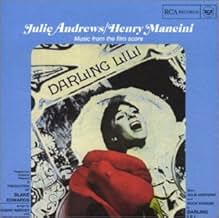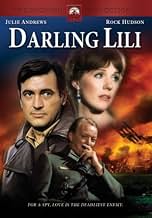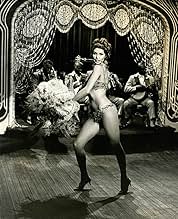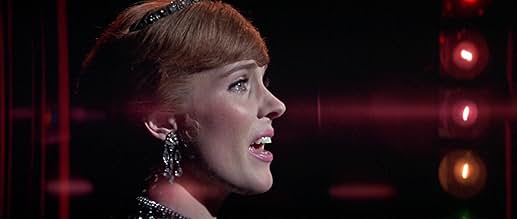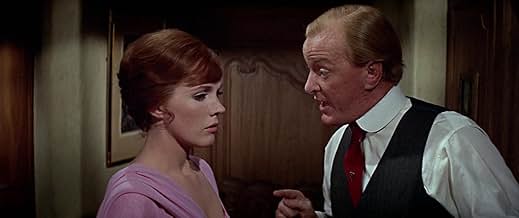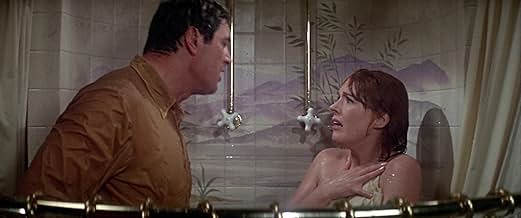IMDb-BEWERTUNG
6,0/10
2581
IHRE BEWERTUNG
Füge eine Handlung in deiner Sprache hinzuSet during World War I, this movie is a cute spin on the Mata Hari legend.Set during World War I, this movie is a cute spin on the Mata Hari legend.Set during World War I, this movie is a cute spin on the Mata Hari legend.
- Regie
- Drehbuch
- Hauptbesetzung
- Für 3 Oscars nominiert
- 1 Gewinn & 7 Nominierungen insgesamt
Arthur Gould-Porter
- Sergeant Wells
- (as A.E. Gould-Porter)
David Armstrong
- Squadron Pilot
- (Nicht genannt)
Yves Barsacq
- French General
- (Nicht genannt)
Empfohlene Bewertungen
After 35 years, I've seen this film again; the 136 minute version at the Anthology Film Archives in New York City's East Village. They also showed the 114 minute version which, according to their production notes, is darker in tone, since it's missing some of the comedy of the piece. Certainly some of the cutesy comedy, which Blake Edwards, the director/producer/writer, also seems to be enamored of in his Pink Panther movies, could be cut.
The film is an attempt to make a mature, romantic musical and was a big flop at the time. Edwards was married to Julie Andrews, the female star of the movie. Andrews had a great success with "Mary Poppins" a few years earlier, and a phenomenal success with "The Sound of Music." She tried repeating the success with the awful (but, perhaps, commercially successful) "Thoroughly Modern Millie," and had a stinker with "Star!", the Gertrude Lawrence story. "Star!" was an adult musical, but it didn't take, so "Darling Lili" was another try at breaking Andrews' goody-two-shoes image. She says "ass" in the movie twice and "bastard" once! The scenes I remember most from the first screening in 1970 are the striptease by Suzette (Gloria Paul) and the aerial sequences, which are pretty dazzling (except for the obvious process shots). In fact, the whole movie is quite lavish and Andrews is gowned and bejeweled beautifully. Edwards seems to have studied the films of Vincente Minnelli and is better at creating some of the Minnellian tone than George Cukor was with the dull "My Fair Lady." In fact, Minnelli was making a movie - "On A Clear Day..." - at Paramount the same time "Darling Lili" was being produced. "...Lili" went into major cost overruns, which could account for "...Clear Day..." being so lackluster in its modern scenes, since major money was being pumped into the Andrews/Edwards film.
The movie isn't terrible. In fact, it's quite charming, if a little long. But the movie-going public is fickle, and Julie Andrews musicals fell quickly out of favor. Rock Hudson is enormously likable as always, but has little to do. The production design is delightful, and it's fun to see Andrews do her striptease (which may not be in the shorter version, and I'm thinking that must have been the version I saw in 1970, because I think I would have remembered it).
Maybe the movie will come out on DVD now that they are showing two versions in NYC. The print was beautiful, by the way. It even included the overture. The audience was a poignant collection of solitary film nerds, not excluding myself!
The film is an attempt to make a mature, romantic musical and was a big flop at the time. Edwards was married to Julie Andrews, the female star of the movie. Andrews had a great success with "Mary Poppins" a few years earlier, and a phenomenal success with "The Sound of Music." She tried repeating the success with the awful (but, perhaps, commercially successful) "Thoroughly Modern Millie," and had a stinker with "Star!", the Gertrude Lawrence story. "Star!" was an adult musical, but it didn't take, so "Darling Lili" was another try at breaking Andrews' goody-two-shoes image. She says "ass" in the movie twice and "bastard" once! The scenes I remember most from the first screening in 1970 are the striptease by Suzette (Gloria Paul) and the aerial sequences, which are pretty dazzling (except for the obvious process shots). In fact, the whole movie is quite lavish and Andrews is gowned and bejeweled beautifully. Edwards seems to have studied the films of Vincente Minnelli and is better at creating some of the Minnellian tone than George Cukor was with the dull "My Fair Lady." In fact, Minnelli was making a movie - "On A Clear Day..." - at Paramount the same time "Darling Lili" was being produced. "...Lili" went into major cost overruns, which could account for "...Clear Day..." being so lackluster in its modern scenes, since major money was being pumped into the Andrews/Edwards film.
The movie isn't terrible. In fact, it's quite charming, if a little long. But the movie-going public is fickle, and Julie Andrews musicals fell quickly out of favor. Rock Hudson is enormously likable as always, but has little to do. The production design is delightful, and it's fun to see Andrews do her striptease (which may not be in the shorter version, and I'm thinking that must have been the version I saw in 1970, because I think I would have remembered it).
Maybe the movie will come out on DVD now that they are showing two versions in NYC. The print was beautiful, by the way. It even included the overture. The audience was a poignant collection of solitary film nerds, not excluding myself!
Julie and Blake deliver a real bomb {no pun intended}of a World War 1 musical with this sloppily made mega budget mess. Julie's voice is always a joy, but the music here is of the "in one ear, out the other" variety. Hudson shows all the romantic magnetism of a buttered scone and his scenes with Julie hold about as much spark as my 1987 Yugo. The comic relief is painfully unfunny, the flying scenes ho hum {with most of the aircraft and even one of the stars, Jeremy Kemp, rehashed from "The Blue Max"}and the whole experience just makes me glad that I saw this on free TV. Its a long way to Tipperary alright, this movie is closer to Verdun....
Blake Edwards' "Darling Lili" is not a great film, but it is better than most people give it credit for. One of the most maligned productions in history (the aerial sequences took 2 years to film, the budget swelled to 3 times the original budget, various cuts of the film only add to the muddle), my final analysis is this: an underrated film whose reputation should soar once it's more widely seen.
This film exists in three versions: the original roadshow version (190 minutes)which Edwards disowned, the general release version (136 minutes)and Edwards' personal director's cut (113 minutes).
Tones shift between versions. The roadshow version had more talky sequences and was a numbing bore. The general release version deleted these sequences and was an improvement, but was still missing something. Edwards' cut was a great improvement. It is more serious in tone than the previous cuts, but the story concucted by Edwards and William Peter Blatty benefits from that approach. Julie Andrews is simply great as Lili, the singer/spy and her singing is at an all time high. Rock Hudson is excellent as her American pilot lover. Only after his inclination was exposed, did people take him seriously as an actor. But he was great all along. The songs by Henry Mancini and Johnny Mercer are strong as is the cinematography (by Russell Harlan, in Panavision)
Sadly, "Darling Lili" is not available on tape or DVD. But luckily for us, AMC shows this very often.
Roadshow version: 1/2* General Release: ** 1/2 Director's Cut: ***1/2
This film exists in three versions: the original roadshow version (190 minutes)which Edwards disowned, the general release version (136 minutes)and Edwards' personal director's cut (113 minutes).
Tones shift between versions. The roadshow version had more talky sequences and was a numbing bore. The general release version deleted these sequences and was an improvement, but was still missing something. Edwards' cut was a great improvement. It is more serious in tone than the previous cuts, but the story concucted by Edwards and William Peter Blatty benefits from that approach. Julie Andrews is simply great as Lili, the singer/spy and her singing is at an all time high. Rock Hudson is excellent as her American pilot lover. Only after his inclination was exposed, did people take him seriously as an actor. But he was great all along. The songs by Henry Mancini and Johnny Mercer are strong as is the cinematography (by Russell Harlan, in Panavision)
Sadly, "Darling Lili" is not available on tape or DVD. But luckily for us, AMC shows this very often.
Roadshow version: 1/2* General Release: ** 1/2 Director's Cut: ***1/2
It was 1970. Julie Andrews had hit her highs onscreen, and her star was starting to fade, at least in the public's eye. "Lili" represented another opportunity for Julie to change her image, coming right after the megamusical "STAR!" which didn't deserve the drubbing *it* received either.
Audiences didn't seem to care for this WWI musical drama. In fact, they were staying away in droves from ANY musical--drama or not.
The shame of it all is that this film, with its many classic moments, was stigmatized by the press who were gunning for Our Fair Julie and her new beau, writer/director/producer Blake Edwards.
But "Lili" really *is* worth seeking out. Julie sings beautifully, especially the haunting "Whistling Away the Dark," a lovely Henri Mancini tune that opens and closes the film. Her performance is nuanced and quite affecting--just watch her as a fat tear silently slides down her cheek after a tumultuous argument with Major Larabee.
Edwards has staged some stunning flight sequences, but the suffer somewhat, in 1990s sensibilities, from the blue-screen process shots needed to get Rock "into" midair. Edwards also can't seem to help himself from sliding into formulaic comedy bits (he apparently thinks a bumbling Frenchman with an umbrella on a roof in a rainstorm is hilarious--it shows up in film after film of his).
The reason to watch "Lili" is for its interesting spin on the Mata Hari legend and the performance of Miss Andrews, who certainly didn't deserve the brickbats that came her way following its release.
Audiences didn't seem to care for this WWI musical drama. In fact, they were staying away in droves from ANY musical--drama or not.
The shame of it all is that this film, with its many classic moments, was stigmatized by the press who were gunning for Our Fair Julie and her new beau, writer/director/producer Blake Edwards.
But "Lili" really *is* worth seeking out. Julie sings beautifully, especially the haunting "Whistling Away the Dark," a lovely Henri Mancini tune that opens and closes the film. Her performance is nuanced and quite affecting--just watch her as a fat tear silently slides down her cheek after a tumultuous argument with Major Larabee.
Edwards has staged some stunning flight sequences, but the suffer somewhat, in 1990s sensibilities, from the blue-screen process shots needed to get Rock "into" midair. Edwards also can't seem to help himself from sliding into formulaic comedy bits (he apparently thinks a bumbling Frenchman with an umbrella on a roof in a rainstorm is hilarious--it shows up in film after film of his).
The reason to watch "Lili" is for its interesting spin on the Mata Hari legend and the performance of Miss Andrews, who certainly didn't deserve the brickbats that came her way following its release.
Except for "Star!", (Which another reviewer understandably considers a "companion piece" to this film), Julie Andrews never starred in a film that was more ideally structured specifically for her many talents than "Darling Lilli." She gets to sing, act, look lovely, even let her hair down and do a striptease in her continuing efforts to get away from her Mary Poppins/Maria Von Trapp image, and much more. Lilli is certainly one of the most interesting characters she ever played; you're never quite sure whether you're supposed to root for or despise this half-English, half-German who is a London music-hall entertainer but also acting as a spy for the Fatherland in World War I and is sent to, um, extract military secrets from American Major William Larabee but falls in love with him and tries to clear both their names for the suspicious French government.
And like "Star!", "Darling Lilli" was released at the wrong time. It had enough "performance numbers" to count as a movie musical, even though it also had elements of drama, comedy, and spy intrigue, and both movie musicals and Julie Andrews were not what critics and audiences were anxious to see in the late 1960s and early 70s, when both films were released. So both bombed at the box office. "Darling Lilli" in particular, judging by the "director's cut" that director Blake Edwards prepared several years later, did not really deserve this fate. While flawed, it is still highly entertaining, and Miss Andrews is utterly radiant, whether acting, stripping, or singing some vintage WW I tunes or some lovely songs written for the film by Henry Mancini and Johnny Mercer. The film should be seen if for no other reason than for the hauntingly beautiful "Whistling Away the Dark" and Julie's tender, achingly vulnerable performance of it.
But as I said, the film itself is not too great. The description of Lilli's character alone is confusing enough, and often it's hard to figure out what is going on. (Perhaps some footage that could've cleared up this confusion is in the original version of the film?) In addition to the rather muddled string of events, Rock Hudson is pretty stiff as Larabee, and the various German, French, and English accents of the supporting characters come and go. The authentic WW I aircraft is cool, but the air sequences, appaarently the ones that took the longest time out of the film's very long shooting period, are the least interesting in the film. And another reviewer also noted the film's uneasy yo-yoing between genres: the "director's cut" is probably the most serious film Edwards (Who happened to have just married Miss Andrews before they started filming this) ever directed, but he can't resist putting in some of his trademark cheap laughs, although several of them are admittenly funny. And all in all, the film is very entertaining, whether as a drama, comedy, musical, or spy thriller, and whenever Julie Andrews is onscreen, all the film's faults seem like quibbles. Obviously, Mr. Edwards is in love with his wife; can you blame him?
And like "Star!", "Darling Lilli" was released at the wrong time. It had enough "performance numbers" to count as a movie musical, even though it also had elements of drama, comedy, and spy intrigue, and both movie musicals and Julie Andrews were not what critics and audiences were anxious to see in the late 1960s and early 70s, when both films were released. So both bombed at the box office. "Darling Lilli" in particular, judging by the "director's cut" that director Blake Edwards prepared several years later, did not really deserve this fate. While flawed, it is still highly entertaining, and Miss Andrews is utterly radiant, whether acting, stripping, or singing some vintage WW I tunes or some lovely songs written for the film by Henry Mancini and Johnny Mercer. The film should be seen if for no other reason than for the hauntingly beautiful "Whistling Away the Dark" and Julie's tender, achingly vulnerable performance of it.
But as I said, the film itself is not too great. The description of Lilli's character alone is confusing enough, and often it's hard to figure out what is going on. (Perhaps some footage that could've cleared up this confusion is in the original version of the film?) In addition to the rather muddled string of events, Rock Hudson is pretty stiff as Larabee, and the various German, French, and English accents of the supporting characters come and go. The authentic WW I aircraft is cool, but the air sequences, appaarently the ones that took the longest time out of the film's very long shooting period, are the least interesting in the film. And another reviewer also noted the film's uneasy yo-yoing between genres: the "director's cut" is probably the most serious film Edwards (Who happened to have just married Miss Andrews before they started filming this) ever directed, but he can't resist putting in some of his trademark cheap laughs, although several of them are admittenly funny. And all in all, the film is very entertaining, whether as a drama, comedy, musical, or spy thriller, and whenever Julie Andrews is onscreen, all the film's faults seem like quibbles. Obviously, Mr. Edwards is in love with his wife; can you blame him?
Wusstest du schon
- WissenswertesA very troubled production, this movie went way over budget and was a box-office flop when released. Director Blake Edwards used the experience of making this movie as the inspiration for the script to S.O.B. - Hollywoods letzter Heuler (1981).
- PatzerIn the "Cafe Can Can" scene the World War I American pilots are said to belong to an "Eagle Squadron" but that term was only used for Americans flying with the RAF in World War II.
- Zitate
Lili Smith: But then, why *does* he drink?
Maj. William Larrabee: Because he's afraid to fly.
Lili Smith: Then why does he fly?
Maj. William Larrabee: Because he likes to drink!
- Crazy CreditsThe Paramount Pictures logo does not appear in the beginning of the film, only at the end of the film.
- Alternative VersionenTwo decades after its original release, director Blake Edwards re-cut the film for the TNT network, shortening it by 22 minutes and dramatically changing its tone. This so-called "director's cut" runs 114 minutes.
- VerbindungenFeatured in Entertainment This Week Salutes Paramount's 75th Anniversary (1987)
- SoundtracksLa Marseillaise
by Claude Joseph Rouget de Lisle
Special French Lyrics Translations by Danielle Mauroy and Michel Legrand
Top-Auswahl
Melde dich zum Bewerten an und greife auf die Watchlist für personalisierte Empfehlungen zu.
- How long is Darling Lili?Powered by Alexa
Details
- Erscheinungsdatum
- Herkunftsland
- Sprachen
- Auch bekannt als
- Darling Lili: Or Where Were You the Night You Said You Shot Down Baron von Richtofen
- Drehorte
- Produktionsfirma
- Weitere beteiligte Unternehmen bei IMDbPro anzeigen
Box Office
- Budget
- 25.000.000 $ (geschätzt)
- Laufzeit
- 2 Std. 16 Min.(136 min)
- Seitenverhältnis
- 2.35 : 1
Zu dieser Seite beitragen
Bearbeitung vorschlagen oder fehlenden Inhalt hinzufügen


